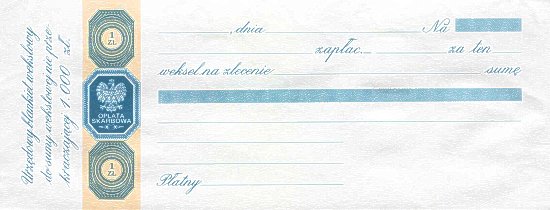LIABILITY OF THE GUARANTOR BY AVAL OF A BILL OF EXCHANGE

Despite the fact that the same term was used (i.e. „poręczenie”) under the Polish law an aval is a separate institution from civil suretyship. Therefore unfortunately even some lawyers who do not deal with law on bills of exchange may be misled. An aval is a collateral securing receivable like civil suretyship however the rules under which a giver of an aval is liable are different and more strict. No wonder that aval is willingly applied in debtor creditor relations thus putting the creditor in a stronger position.
An aval (a guarantee given in the bill of exchange) regulated in art. 30-32 of the Polish Act on Bills of Exchange of 28th April 1936 (O.J. unified text of 2016, item 160) secures payment of the sum stipulated in the bill of exchange and accordingly in the promissory note. Aval is given in a written form in the document of a bill of exchange or on an allonge. It is expressed by the words ‘good as aval’ (‘bon pour aval’) or by any other equivalent formula. It is signed by the giver of the ‘aval’. It is deemed to be constituted by the mere signature of the giver of the ‘aval’ placed on the face of the bill, except in the case of the signature of the drawee or of the drawer. An ‘aval’ must specify for whose account it is given. In default of this it is deemed to be given for the drawer.
According to art. 32 of the Act on Bills of Exchange the giver of an ‘aval’ is bound in the same manner as the person for whom he has become guarantor. His undertaking is valid even when the liability which he has guaranteed is inoperative for any reason other than defect of form. This article provides for that the liability of a guarantor is accessory in a formal way which means that he is liable for the person for whom he has become a guarantor but according to the text of the bill of exchange, not in the real scope of liability of that person. This strict liability may be sometimes mitigated as referred to below. The rule of art. 7 of the Act on Bills of Exchange is applied to a guarantor by aval as well. According to this rule a giver of an aval is liable even if the person for whom he gave aval does not exist or exists but the signature of that person was forged.
The strict liability of a guarantor consist in the scope of defences against the holder of the bill of exchange. These defences are limited according to art. 17 of the Act on Bills of Exchange like the defences of other debtors under the bill of exchange. This limitation concerns personal defences of the debtor against the drawer or former holders of the bill of exchange. A guarantor may therefore without limitations set up e.g. defences concerning the text of the bill of exchange against the holder however the personal defences he had against the payee may be set up only within the limits stipulated in art. 17 of the Act on Bills of Exchange. These limitations are applied when the bill of exchange has been transferred by means of endorsement whereas they do not concern a situation when the transfer has been made by an assignment.
As a rule a guarantor may not set up defences concerning so called base relation. For example if the bill of exchange was issued to secure the return of a loan and additionally an aval was given for the drawer (borrower), the guarantor may not set up directly defences of the drawer arising from the loan agreement. It is worth mention that this situation differs from the one of the surety who under art. 883 §1 of the Civil Code may raise against the creditor all the defences that the debtor had.
If the bill of exchange was incomplete when issued (bill of exchange in blanco) a guarantor may raise against the payee that it has been completed contrary to the agreement. However against a further holder he may raise such defences only if the one acquired a bill of exchange in bad faith or in acquiring it, has been guilty of gross negligence. This may concern the case when a bill of exchange has been completed to the sum exceeding the value of the claim arising from the base relation. If the bill of exchange has been issued as complete a guarantor may appeal to the agreement between the creditor and a guarantor concerning the goal of the aval. Such an agreement may limit the independence of the obligation of a guarantor and make them dependent e.g. from the existence of the obligation under the base relation or fulfillment of a condition. This however is a personal defence and as a rule they may not be set up against further holders acquiring a bill of exchange by endorsement (see judgment of the Polish Supreme Court of 12th May 2011, III CSK 254/10).
The liability of a guarantor differs depending on for whom the aval was given therefore in each case the one must analyze which defences a guarantor may use.

